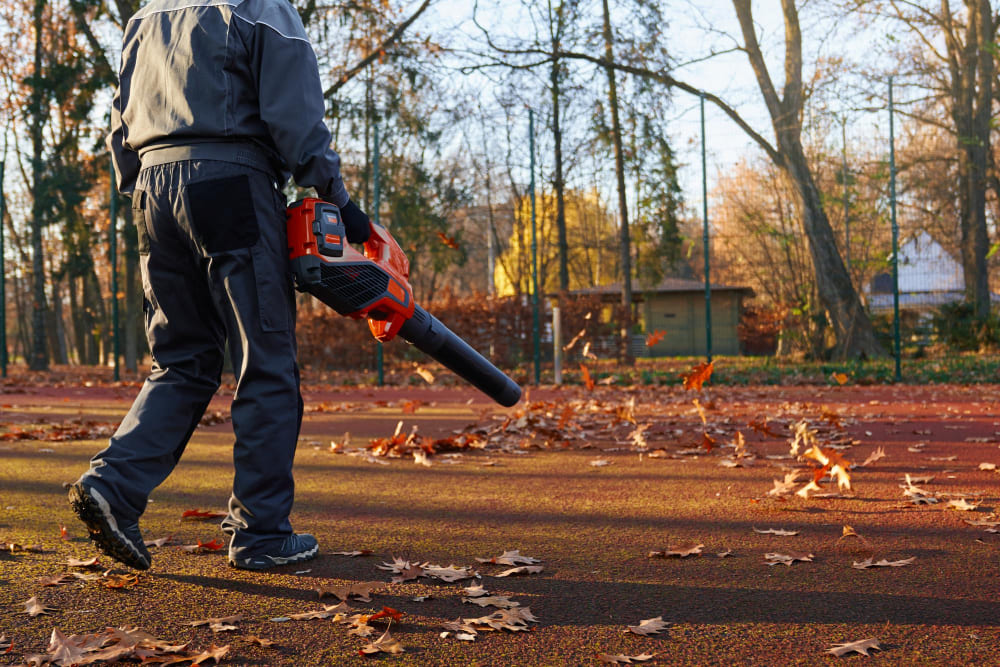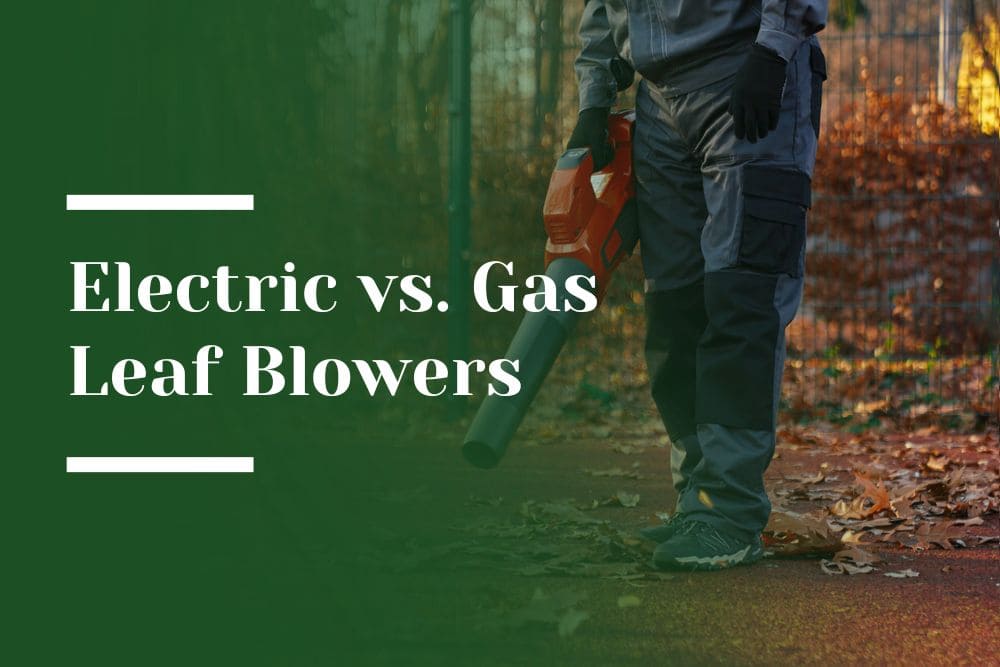When it comes to maintaining a pristine lawn or garden, choosing the right leaf blower is essential. Leaf blowers are crucial tools for anyone committed to keeping their outdoor space tidy. However, the choice between an electric leaf blower and a gas-powered one can feel overwhelming. Each type has its strengths and drawbacks, and the right option often depends on your specific landscaping needs. In this article, we’ll explore the key differences, benefits, and limitations of both electric and gas leaf blowers to help you make the best decision for your landscape.
Electric Leaf Blowers for your Lawn Care

Electric leaf blowers have become increasingly popular, and for good reason. With advancements in battery technology and efficiency, they are now almost as powerful as gas-powered models, making them a strong contender for both homeowners and professional landscapers.
Benefits of Electric Leaf Blowers
- Environmentally Friendly:
Electric leaf blowers produce zero emissions, making them an eco-conscious choice for homeowners who prioritize sustainability in their luxury landscaping practices. - Lightweight and Easy to Handle:
These blowers are typically lighter than gas models, making them ideal for smaller lawn care tasks and for individuals who want ease of use without sacrificing performance. - Quiet Operation:
Electric models operate much more quietly than gas-powered blowers, making them perfect for residential areas where noise restrictions might apply. - Low Maintenance:
Unlike gas blowers, electric blowers don’t require fuel mixing, oil changes, or regular engine tune-ups. This makes them an excellent option for homeowners looking for hassle-free landscape maintenance. - Cost-Effective:
Electric blowers are generally less expensive upfront than gas-powered ones, and their long-term operating costs are also lower since they don’t require fuel or intensive maintenance.
- Environmentally Friendly:
Drawbacks of Electric Leaf Blowers
- Limited Run Time:
Cordless electric leaf blowers typically run for 20–25 minutes per charge, which may not be sufficient for large lawns or commercial landscaping tasks. However, purchasing additional batteries or opting for electric backpack blowers can extend run time. - Dependent on Charging:
If you forget to charge your batteries, you could be stuck waiting before tackling your lawn care tasks. - Not Ideal for Heavy-Duty Tasks:
For extreme applications like clearing wet leaves, gravel, or debris from large properties, electric blowers may lack the raw power of gas blowers.
Understanding the Basics of Leaf Blower Power: MPH and CFM
Before diving into the electric vs. gas debate, it’s important to understand two key metrics of a leaf blower’s performance: miles per hour (MPH) and cubic feet per minute (CFM). These two factors are often advertised to indicate a blower’s power. While they may seem critical, most modern leaf blowers offer an average range of power suitable for most landscaping needs.
- MPH (Miles Per Hour): Indicates the speed at which air is expelled from the blower. High MPH is useful for moving lightweight materials like dry leaves quickly.
- CFM (Cubic Feet Per Minute): Measures the volume of air the blower can move. A high CFM is better for heavier debris like wet leaves or gravel.
For Palo Alto homeowners focusing on basic lawn care or small-scale landscaping, the advertised MPH and CFM numbers can sometimes feel like marketing gimmicks. However, for landscape experts handling more demanding projects—like clearing large properties or luxury landscaping designs—these metrics might carry more weight.
Gas-Powered Leaf Blowers: The Workhorse of Landscape Experts

For decades, gas-powered leaf blowers have been the gold standard for professional landscapers and those tackling larger or more challenging outdoor spaces. These models deliver unparalleled power and performance, making them a staple for luxury landscaping projects.
Benefits of Gas Leaf Blowers
- Unmatched Power:
Gas blowers typically have higher CFM and MPH ratings, which makes them ideal for moving heavy debris, wet leaves, and even small stones. - Longer Run Time:
Unlike electric blowers, gas blowers can run continuously as long as you have fuel on hand. This makes them suitable for large lawns or professional landscaping jobs. - Versatile Applications:
Gas blowers can handle everything from standard lawn care to more demanding tasks, such as clearing construction debris or maintaining Palo Alto estates with intricate landscaping designs. - Durability:
Built to withstand heavy use, gas blowers are designed for rugged applications, making them the go-to choice for landscape experts handling high-volume or intensive projects.
- Unmatched Power:
Drawbacks of Gas Leaf Blowers
- Environmental Concerns:
Gas blowers emit greenhouse gases, making them less environmentally friendly than electric models. This is something to consider if you aim to incorporate eco-conscious practices into your landscape maintenance routine. - Noisy Operation:
Gas-powered blowers are significantly louder, which can be a drawback for residential areas or noise-sensitive environments. - Maintenance Requirements:
These blowers require regular maintenance, including fuel and oil mixing, spark plug replacements, and air filter cleaning. - Heavier and Bulkier:
Gas blowers are generally heavier and less ergonomic, which can be a challenge for those who prioritize comfort and ease of use.Electric vs. Gas Leaf Blowers: Which One Should You Choose?
The decision ultimately depends on your landscaping needs, property size, and personal preferences. Here’s a quick guide to help you decide:
Choose Electric Leaf Blowers If:
- You have a small to medium-sized lawn.
- You prioritize eco-friendly lawn care solutions.
- Noise restrictions are a concern in your area.
- You want a lightweight, low-maintenance option.
Choose Gas-Powered Leaf Blowers If:
- You’re a professional landscaper or have a large property.
- Your lawn care involves heavy-duty tasks like clearing wet leaves or gravel.
- You require extended run time without interruptions.
- Durability and high power are your top priorities.
Tips for Leaf Blower Maintenance
If you opt for a gas-powered leaf blower, regular maintenance is essential to ensure it runs smoothly:
- Fuel Mix: Use the correct gas/oil ratio to avoid damaging the engine.
- Air Filters: Clean or replace air filters annually to maintain optimal performance.
- Spark Plugs: Check and replace spark plugs as needed to keep the blower running efficiently.
- Storage: Always empty the fuel tank before long-term storage to prevent clogs or damage.
For electric blowers, the maintenance requirements are minimal, but it’s still essential to:
- Keep batteries charged and stored correctly.
- Clean the blower nozzle and vents to prevent clogs.
- Replace batteries when they lose efficiency over time.
Choosing between an electric and gas leaf blower depends on your specific lawn care requirements, property size, and environmental priorities. For most homeowners, an electric blower offers a convenient, eco-friendly solution for maintaining a beautiful yard. However, for large-scale or commercial landscaping projects, gas blowers still hold their ground as the most powerful option.
Whether you’re a homeowner or a landscape expert, selecting the right leaf blower will ensure that your outdoor spaces stay clean, well-maintained, and visually appealing an essential aspect of luxury landscaping.



